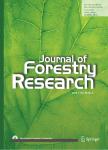Distribution of Malpighia mexicana in Mexico and its implications for Barranca del Río Santiago
在为峡谷 del R í o 圣地亚哥的墨西哥和它的含意的 Malpighia mexicana 的分发作者机构:Instituto de BotánicaCentro Universitario de Ciencias Biológicas y AgropecuariasUniversidad de GuadalajaraMéxicoCamino Ramón Padilla Sánchez No.2100.Nextipac45200 ZapopanJaliscoMexico Depto.Ingeniería ForestalLaboratorio de SelviculturaDendrocronología y Cambio ClimáticoDendrodatLab-ERSAFUniversidad de CórdobaCampus de RabanalesCtra.N-IVkm.39614071 CórdobaSpain Departamento de Producción ForestalCentro Universitario de CienciasBiológicas y AgropecuariasUniversidad de GuadalajaraMéxicoCamino Ramón Padilla Sánchez No.2100 Nextipac45200 ZapopanJaliscoMexico
出 版 物:《Journal of Forestry Research》 (林业研究(英文版))
年 卷 期:2021年第32卷第3期
页 面:1095-1103页
核心收录:
主 题:Malpighia mexicana Maxent Warmdry tropical forest Río Santiago Genetic resources Ecological niche model Manzanita
摘 要:Wild plants represent relatively unexplored resource of high economic potential,especially as an alternative to developing new crops and,even more relevant,for improving existing crops and contributing to nutrition and *** wild species M alpighia mexicana(manzanita)has a wide tradition of food,medicinal and ornamental use in *** is part of the American-origin group of tropical shrubs that produce edible red fruits,such as A cerola,which is considered the most important natural source of vitamin C in the *** the role played by *** in Mexico,and particularly in Barranca del Río Santiago(Santiago River Canyon),we modelled its potential distribution in both geographical *** used species records from databases,local herbaria and records collected by the authors as well as climatic variables representing long term average,variability and extreme conditions of temperature and *** fit the models we used the modelling algorithm Maxent and selected an adequate configuration by testing a range of model complexity *** results indicate a clear species preference for warm-dry tropical forest,most extensively in the Balsas river depression and the central valleys of *** probability of the species presence in the western region was also high,although the probability was also high for smaller surface areas,such as the region of Santiago river canyons,which are covered by warm-dry tropical forests.



